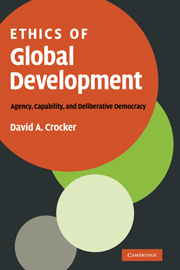Book contents
- Frontmatter
- Contents
- List of figures
- Acknowledgments
- 1 Introduction
- Part I Development ethics
- 2 Agreements, controversies, and challenges
- 3 Ethics and development theory-practice
- Part II The capability approach: ethical foundations
- Part III Strengthening and applying the capability approach
- Part IV Deliberative democracy, participation, and globalization
- Index of names
- Index of subjects
2 - Agreements, controversies, and challenges
Published online by Cambridge University Press: 22 September 2009
- Frontmatter
- Contents
- List of figures
- Acknowledgments
- 1 Introduction
- Part I Development ethics
- 2 Agreements, controversies, and challenges
- 3 Ethics and development theory-practice
- Part II The capability approach: ethical foundations
- Part III Strengthening and applying the capability approach
- Part IV Deliberative democracy, participation, and globalization
- Index of names
- Index of subjects
Summary
Development ethicists assess the ends and means of local, national, regional, and global development. National policymakers, project managers, grassroots communities, and international aid donors involved in development in poor countries often confront moral questions in their work. Development scholars recognize that social‐scientific theories of “development” and “underdevelopment” have ethical as well as empirical and policy components. Development philosophers and other ethicists formulate ethical principles relevant to social change in poor countries, and they analyze and assess the moral dimensions of development theories and seek to resolve the moral quandaries lurking in development policies and practice.
Sources
Several sources exist for the moral assessment of the theory and practice of development. First, activists and social critics, such as Mohandas Gandhi (beginning in the 1890s) in South Africa and India, Raúl Prébisch (beginning in the 1940s) in Latin America, and Frantz Fanon (in the 1960s) in Africa criticized colonialism and orthodox economic development. Second, as discussed in Chapter 1, since the early 1960s, American development scholar, critic, and development practitioner Denis Goulet – drawing inspiration from the work of Louis‐Joseph Lebret and Albert Hirschman, Benjamin Higgins, and Gunner Myrdal and American sociologist Peter Berger – pioneered what we now call “development ethics” by arguing that development theory, policy, and practices should be subjected to ethical assessment. Both Goulet and Berger insisted that what was often called development was bad for human beings and that both ethics and development would benefit from interaction.
- Type
- Chapter
- Information
- Ethics of Global DevelopmentAgency, Capability, and Deliberative Democracy, pp. 35 - 66Publisher: Cambridge University PressPrint publication year: 2008



